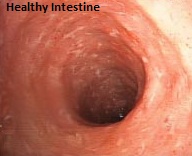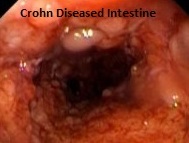HGH or human growth hormone therapy is not approved for the treatment of inflammatory bowel disease (IBD) there has been success seen in the small number of patients studied. Currently the FDA has approved the use of HGH for only a handful of conditions. However, off-label use is becoming more and more common, especially when it comes to anti aging purpose, and more recently HGH as a treatment for IBD . It is important that physicians and patients alike are familiar with potential adverse effects of HGH particularly when the injection form is prescribed. Those side effects reduce significantly when HGH supplements are used, and in many situations an HGH supplement is sufficient to be beneficial.
Pediatric Crohn’s Disease
 For more than 20 years, HGH has been used to treat children with short stature. It has been 10 years since it was first studied in pediatric Crohn’s disease. Positive results were seen and a GH resistant state was established. However, it has not been approved for the treatment of IBD in adults.
For more than 20 years, HGH has been used to treat children with short stature. It has been 10 years since it was first studied in pediatric Crohn’s disease. Positive results were seen and a GH resistant state was established. However, it has not been approved for the treatment of IBD in adults.
Adult Crohn’s and IBD
 HGH was effective in treating adults with Crohn’s disease in a small randomized study, it has not been investigated in a larger controlled trial. And while not approved for the treatment of IBD it has also been shown to work effectively. It’s actually quite common for internists or gastroenterologists to encounter patients with Crohn’s or IBD who were taking HGH for anti aging and enjoying the benefits with their gastrointestinal issues.
HGH was effective in treating adults with Crohn’s disease in a small randomized study, it has not been investigated in a larger controlled trial. And while not approved for the treatment of IBD it has also been shown to work effectively. It’s actually quite common for internists or gastroenterologists to encounter patients with Crohn’s or IBD who were taking HGH for anti aging and enjoying the benefits with their gastrointestinal issues.
Will Human Growth Hormone Improve IBD
Primarily growth hormone used in the treatment of IBD has been in children who have suffered from growth delay and also suffering from IBD. Growth delay in children who suffer from IBD can be the result of a number of factors including the severity of the disease, genotype, nutritional status, and inflammation.
The evidence in both adults and children suggests that the GH/IGF-1 axis are functionally impaired in those patients who have IBD, which is characterized by a state of GH resistance where there is normal GH secretion but impaired GH induction in the target genes.
HGH replacement is beneficial because it increases ligand and circulating GH and IGF-1 levels. In addition, HGH and other trophic factors act upon mesenchymal cells, epithelial cells, and immune cells to promote improved mucosal healing and integrity and reduced inflammation.
There is evidence from experiments that supports the use of HGH for treating IBD. Studies in rats with chemically induced colitis have shown that GH therapy promotes intestinal mucosal repair, and GH has been shown to reduce intestinal fibrosis and stimulate the expression of antifibrinogenic signaling molecules. There is a fair amount of experimental proof that supports using HGH to treat IBD.
Clinical Studies Using HGH to Treat IBD
- In a placebo-controlled pilot study of 37 adult patients with active CD, GH therapy given concurrently with a high protein diet significantly improved Crohn’s Disease Activity Index (CDAI) scores and reduced the need for additional medications.
- There was a mean decrease of 143 points on the CDAI from baseline baseline values in HGH-treated subjects, as compared with a 19 point drop in the placebo group.
- Several clinical trials have also shown that GH has beneficial anabolic effects in patients with short bowel syndrome (SBS), many of whom had CD as an indication for bowel resection.
- A meta-analysis of 13 trials on 258 patients conducted on the safety and efficacy of growth hormone with a modified high-carbohydrate, low-fat diet in patients with SBS showed a positive treatment effect on body weight, stool output, lean body mass, absorption of carbohydrates, absorption of nitrogen, absorption of D-xylose, and time off total parenteral nutrition in these patients .
Conclusion
HGH therapy for IBD has the potential to improve disease activity but because the studies have been in relatively small numbers it is currently not approved by the FDA for treatment of IBD, although it is approved for use in children and adults for a limited number of other conditions. Off label use of HGH for the treatment of IBD is actually relatively common and continues to grow as a treatment option.
It is important that HGH users are aware of the risks associated with the use of HGH injections. For many conditions HGH supplements are adequate and have a much lower risk of side effects. If you feel your condition is serious you should see your physician immediately.
Natural Growth Hormone Products












Do you know of any doctors or hospitals in the US that are Using HGH for the treatment of Crohn’s. My doctor wont do it because he is too afraid to prescribe HGH. His answer was that it is an off label use and the liabilities for him are big if anything goes wrong. I personally think that he is worried mostly because of the controversy surrounding HGH.